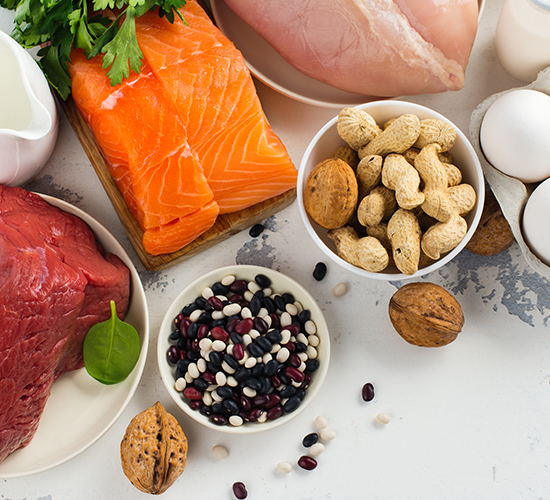The Best Protein For Heart

Proteins, also referred to as the building blocks of the body are responsible for keeping our body and mind healthy. However, with too much of emphasis being appended to a protein-rich diet, most people follow the trend chauvinistically without ascertaining, if the protein they are consuming is really good for their health, especially the heart!
High intake of animal-based food such as meat, which is rich in saturated fat content, can raise your LDL or bad cholesterol levels, increasing the risk of coronary heart disease. However, avoiding meat won’t altogether reduce your risk of heart disease as dairy products like cheese and butter are also a major source of saturated fat.
Eggs and red meat are further known to contain carnitine, a compound that forms a substance (which when broken by gut bacteria) that reportedly causes hardening of arteries. So which sources of proteins are best for the heart? Let’s find out.
Choose The Heart-Healthy Proteins[1],[2],[3]
When incorporating protein-based foods in the diet, make sure to choose the ones that contain low fat. Below is the low-down of various protein-based foods that have less fat content.
1. Legumes
Legumes such as lentils, soybeans, chickpeas, peas, kidney beans, black beans, pigeon peas etc. contain saturated fat-free proteins, which are good for your heart. They also contain heart-healthy fibre, which helps reduce cholesterol. Legumes are effective in keeping high blood pressure in check and increase the count of healthy gut bacteria. The regular dals – moong dal, arhar dal and masoor dal thus make great food choices.
2. Nuts
Nuts such as walnuts, cashews, peanuts, pecans and almonds are rich in proteins, and mono-unsaturated fatty acids that help regulate cholesterol levels. Include a handful of nuts in your daily diet. You can include nuts as a snack or add to your breast cereals.
3. Fish
Fish varieties such as Carpo fish (Rohu), Pomfret, Indian Mackerel (Bangda), Indian Salmon (Rawas) and Tuna are best sources of protein and omega-3 fatty acids. Omega-3 fatty acids have been known to reduce cardiovascular problems. If consumed in moderation, fish can help ward off a number of lifestyle-related problems as well such as – boost metabolism, aid in weight loss, help prevent blood clots and lower blood pressure.
4. Low-Fat Dairy Products
Since dairy products contain saturated fat, which can raise blood cholesterol levels, opt for low-fat versions of milk, cheese, butter and yoghurt. Instead of having fat and sugar-laden ice creams, go for low-calorie ice creams occasionally.
Also, fortified low-fat milk is an abundant source of vitamin D and calcium, which help keep bones and teeth strong. Avoid skipping dairy products altogether, as they are excellent sources of protein, vitamins B, minerals, calcium and vitamin D.
5. Poultry
Skinless chicken is another best source of protein that has fewer calories and is good for heart health. Consider trimming the excess fat in the poultry to obtain protein-rich lean meat.
How Much Protein Should You Consume?[4]
For a healthy heart and a healthy body, it is essential to consume different types of proteins but in the right amount. The recommended daily allowance (RDA) can vary significantly depending on your age, weight, gender and other factors like pregnancy, or lactating mothers.
According to ICMR (Indian Council of Medical Research) guidelines, the recommended safe intake of protein for an adult is calculated at 1.0 gm/kg. For instance, a man weighing 60 kg and a woman weighing 55 kg would require 60gms and 55gms of protein each day respectively. Further, a pregnant woman would require additional 23gms per day while lactating mothers require 19gms protein per day.
References:
- Protein and Heart Health. Available from https://www.heart.org/en/healthy-living/healthy-eating/eat-smart/nutrition-basics/protein-and-heart-health Accessed on [09 th February, 2020]
- Heart-Healthy Protein: How to Go Lean. Available from https://www.everydayhealth.com/hs/eating-for-heart-health/heart-healthy-protein-go-lean/ Accessed on [09 th February, 2020]
- The Best Proteins for Your Heart. Available from https://www.healthline.com/health/heart-disease/heart-healthy-proteins#1 Accessed on [09 th February, 2020]
- Daily Protein Requirements for Indians based on Food Habits. Available from https://foodsafetyhelpline.com/daily-protein-requirements-indians-based-food-habits/ Accessed on [09 th February, 2020]